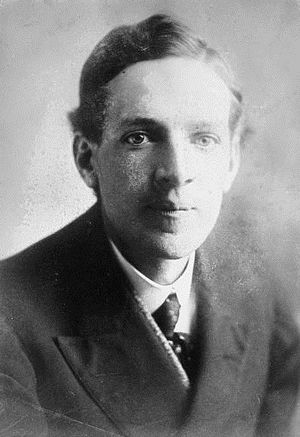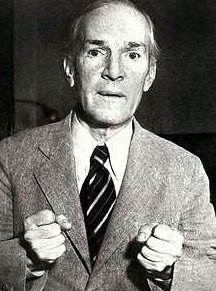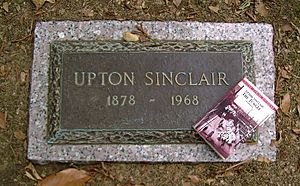Upton Sinclair facts for kids
Quick facts for kids
Upton Sinclair
|
|
|---|---|
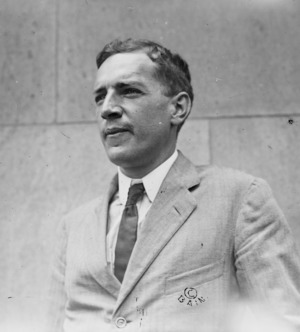
Sinclair in 1900
|
|
| Born |
Upton Beall Sinclair Jr.
September 20, 1878 Baltimore, Maryland, U.S.
|
| Died | November 25, 1968 (aged 90) Bound Brook, New Jersey, U.S.
|
| Resting place | Rock Creek Cemetery Washington, D.C., U.S. |
| Alma mater | City College of New York Columbia University |
| Occupation |
|
|
Notable work
|
The Jungle |
| Political party |
|
| Spouse(s) |
|
| Relatives | Arthur Sinclair (great-grandfather), Wallis Simpson (cousin), Corinne Mustin (cousin) |
| Signature | |
Upton Beall Sinclair Jr. (born September 20, 1878 – died November 25, 1968) was an American writer and political activist. He wrote nearly 100 books and other works. Sinclair was very popular in the early 1900s.
He won the Pulitzer Prize for Fiction in 1943 for one of his novels. He was also known as a "muckraker". This term describes journalists who expose problems in society.
In 1906, Sinclair became famous for his novel The Jungle. This book showed the terrible working and hygiene conditions in the American meatpacking industry. It caused a huge public reaction.
This public outcry helped lead to new laws. These included the 1906 Pure Food and Drug Act and the Federal Meat Inspection Act. These laws made food safer for everyone.
Sinclair also wrote The Brass Check in 1919. This book exposed problems in American journalism. It talked about "yellow journalism", which is news that uses sensational stories to get attention.
He also wrote many novels that can be read as historical works. These books described life in the industrial United States. He showed what it was like for both workers and factory owners.
Books like King Coal (1917), Oil! (1927), and The Flivver King (1937) described working conditions in the coal, oil, and auto industries. The Flivver King was about Henry Ford and his car company.
Sinclair was a strong supporter of socialism. He ran for political office several times. He was the Democratic Party candidate for governor of California in 1934.
Contents
Early Life and Education
Upton Sinclair was born in Baltimore, Maryland. His parents were Upton Beall Sinclair Sr. and Priscilla Harden Sinclair. His family had British roots.
As a child, Sinclair saw both rich and poor ways of life. His mother's family was very wealthy. His father's family had lost their money after the American Civil War. This experience greatly influenced his writing.
Upton loved reading from a young age. He read all his mother's books to learn about the world. He started school later than most kids, at age 10.
In 1888, his family moved to Queens, New York City. Upton started the City College of New York just before his 14th birthday. He wrote jokes and stories for magazines to pay for his studies.
He graduated from City College in 1897. He then studied law at Columbia University. But he was more interested in writing. He learned several languages and supported himself by writing adventure stories.
He wrote a lot of fiction every day. He left Columbia without a degree. Over the next four years, he wrote four books. These books were liked by critics but did not sell well.
Upton Sinclair's Career
Upton Sinclair saw himself as a poet. But he became famous for his novels. In 1904, he spent seven weeks working secretly in Chicago's meatpacking plants.
He was researching his novel, The Jungle (1906). This book exposed the harsh conditions in the plants and the tough lives of poor immigrants. When it was published, it became a huge success.
With the money from The Jungle, Sinclair started a community called the Helicon Home Colony. It was in Englewood, New Jersey. He also ran for Congress as a Socialist candidate.
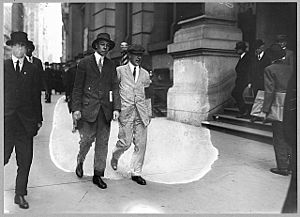
In 1913–1914, Sinclair visited the coal fields in Colorado. This inspired his book King Coal. He also helped organize protests against John D. Rockefeller Jr. in New York City.
In the 1920s, the Sinclairs moved to California. They lived there for almost 40 years. Upton and his second wife, Mary Craig, even produced some films.
Other Interests
Besides his political writing, Sinclair was interested in occult topics. He experimented with telepathy, which is the idea of communicating thoughts without speaking.
His book Mental Radio (1930) shared stories of his wife Mary's telepathic experiences. This book even led to the creation of a parapsychology department at Duke University.
Political Journey
Sinclair was a member of the Socialist Party of America for many years. He ran for office several times. In the 1920s, he moved to Monrovia, California.
There, he helped start the state's chapter of the American Civil Liberties Union. He ran for the United States House of Representatives in 1920 and for the United States Senate in 1922. He did not win these elections.
He also ran for governor of California in 1926 and 1930. He gained many votes but was not elected.
In 1923, Sinclair supported the free speech rights of workers. He spoke at a rally in California. He began to read from the United States Bill of Rights, but he was arrested.
In 1934, Sinclair ran for governor of California again. This time, he ran as a Democrat. His plan was called the End Poverty in California movement (EPIC).
He gained a lot of support and won the Democratic nomination. He received 879,000 votes, which was his most successful election. However, he lost to the current governor, Frank Merriam.
Hollywood movie studios were against Sinclair. They pressured their employees to support Merriam. They even made fake propaganda films to attack Sinclair.
Sinclair had been a Socialist Party member for a long time. He became a Democrat in 1934 but still believed in socialist ideas. After losing the election, Sinclair stopped focusing on politics and returned to writing.
In 1935, he wrote I, Candidate for Governor: And How I Got Licked. In this book, he described the unfair tactics used against him. He famously wrote: "It is difficult to get a man to understand something, when his salary depends upon his not understanding it."
Personal Life
In 1900, Sinclair married Meta Fuller. Their son, David, was born in 1901. Meta and her family wanted Sinclair to get a more stable job.
In 1910, the Sinclairs moved to Arden, Delaware. In 1911, Sinclair was arrested for playing tennis on a Sunday. He spent 18 hours in jail.
In 1913, Sinclair married Mary Craig Kimbrough. She was from a well-known family in Mississippi. They met at one of his lectures. In the 1920s, they moved to California. They were married until she passed away in 1961.
Later that same year, Sinclair married his third wife, Mary Elizabeth Willis. They moved to Buckeye, Arizona, and then to Bound Brook, New Jersey. Sinclair passed away in a nursing home in 1968. He is buried in Rock Creek Cemetery in Washington, D.C..
His Writing Style
Sinclair spent his writing career showing and criticizing social and economic problems. He wrote about the unfairness of capitalism. He also showed the huge impact of poverty on working people.
The Jungle
His most famous novel, The Jungle, was first published in a socialist newspaper. It came out as a book in 1906. Sinclair spent six months researching the meatpacking industry in Chicago for the book.
He wanted to show how the system hurt people. The novel tells the story of Jurgis Rudkus, an immigrant from Lithuania. He works in a Chicago meat factory.
Sinclair described the dirty and cruel conditions workers faced. This shocked readers and made them want change. The book led to new laws for food safety.
President Theodore Roosevelt read The Jungle. He agreed with some of Sinclair's points. He said, "Radical action must be taken to do away with the efforts of arrogant and selfish greed on the part of the capitalist."
The Brass Check
In The Brass Check (1919), Sinclair strongly criticized the "free press" in the United States. He talked about how newspapers used "yellow journalism". This was a type of reporting that used exaggerated stories.
Sinclair called The Brass Check "the most important and most dangerous book I have ever written." He believed that American journalism served the rich and ignored the poor.
Sylvia Novels
- Sylvia (1913) was a novel about a girl from the Southern United States. Sinclair's wife, Mary Craig Sinclair, said she wrote the book based on her own experiences. Upton helped her and published it under his name.
- Sylvia's Marriage (1914) was a sequel. Craig and Sinclair also worked together on this book. It was also published under Upton Sinclair's name.
I, Governor of California, and How I Ended Poverty
This was a pamphlet Sinclair published in 1934. He wrote it before running for governor of California. In the book, he explained his plans to run as a Democrat. He imagined winning the election and ending poverty.
Lanny Budd Series
Between 1940 and 1953, Sinclair wrote 11 novels. These books featured a character named Lanny Budd. Lanny was the son of an American arms maker.
Lanny Budd was shown as someone who knew world leaders. He not only saw important events but often helped make them happen. He was a sophisticated person who could easily mix with people from all walks of life.
Sinclair placed Lanny Budd within major political events in the early 20th century. These novels were very popular. They were translated and published in 21 countries.
The third book in the series, Dragon's Teeth (1942), won the Pulitzer Prize in 1943.
The Lanny Budd series includes:
- World's End, 1940
- Between Two Worlds, 1941
- Dragon's Teeth, 1942
- Wide Is the Gate, 1943
- Presidential Agent, 1944
- Dragon Harvest, 1945
- A World to Win, 1946
- Presidential Mission, 1947
- One Clear Call, 1948
- O Shepherd, Speak!, 1949
- The Return of Lanny Budd, 1953
Other Works
Sinclair was very interested in health and nutrition. He tried different diets and even fasting. He wrote about this in his book, The Fasting Cure (1911).
He believed that fasting regularly was important for health. He said, "I had taken several fasts of ten or twelve days' duration, with the result of a complete making over of my health".
He also preferred a diet of mostly raw vegetables and nuts. For long periods, he was a vegetarian.
Films Based on His Work
- The Jungle (1914) was a silent film based on his 1906 novel. This film is now considered lost. Sinclair appeared in the film to support it.
- The Wet Parade (1932) was a film based on Sinclair's 1931 novel. It was directed by Victor Fleming.
- Walt Disney Productions made The Gnomobile (1937) into a musical movie. It was called The Gnome-Mobile (1967).
- Oil! (1927) was adapted into the film There Will Be Blood (2007). This movie starred Daniel Day-Lewis. It won two Oscars.
- In the film Mank (2020), Bill Nye played Upton Sinclair. It showed Sinclair running for governor in 1934.
List of Works
Fiction
- Sinclair, Upton. Upton sinclair anthology (1947) online
- Engs, Ruth Clifford, ed. Unseen Upton Sinclair: Nine Unpublished Stories, Essays and Other Works. (McFarland & Co. 2009).
- Courtmartialed – 1898
- Saved By the Enemy – 1898
- The Fighting Squadron – 1898
- A Prisoner of Morro – 1898
- A Soldier Monk – 1898
- A Gauntlet of Fire – 1899
- Holding the Fort – 1899
- A Soldier's Pledge – 1899
- Wolves of the Navy – 1899
- Springtime and Harvest – 1901, reissued the same year as King Midas
- The Journal of Arthur Stirling – 1903
- Off For West Point – 1903
- From Port to Port – 1903
- On Guard – 1903
- A Strange Cruise – 1903
- The West Point Rivals – 1903
- A West Point Treasure – 1903
- A Cadet's Honor – 1903
- Cliff, the Naval Cadet – 1903
- The Cruise of the Training Ship – 1903
- Prince Hagen – 1903
- Manassas: A Novel of the War – 1904, reissued in 1959 as Theirs be the Guilt
- A Captain of Industry – 1906
- The Jungle – 1906
- The Overman – 1907
- The Industrial Republic – 1907
- The Metropolis – 1908
- The Moneychangers – 1908, reprinted as The Money Changers
- Samuel The Seeker – 1910
- Love's Pilgrimage – 1911
- Damaged Goods – 1913
- Sylvia – 1913
- Sylvia's Marriage – 1914
- King Coal – 1917
- Jimmie Higgins – 1919
- Debs and the Poets – 1920
- 100% - The Story of a Patriot – 1920
- The Spy – 1920
- They Call Me Carpenter: A Tale of the Second Coming – 1922
- The Millennium – 1924
- The Spokesman's Secretary – 1926
- Money Writes! – 1927
- Oil! – 1927
- Boston, 2 vols. – 1928
- Mountain City – 1930
- Roman Holiday – 1931
- The Wet Parade – 1931
- American Outpost – 1932
- The Way Out (novel) – 1933
- Immediate Epic – 1933
- The Lie Factory Starts – 1934
- The Book of Love – 1934
- Depression Island – 1935
- Co-op: a Novel of Living Together – 1936
- The Gnomobile – 1936, 1962
- Wally for Queen – 1936
- No Pasaran!: A Novel of the Battle of Madrid – 1937
- The Flivver King: A Story of Ford-America – 1937
- Little Steel – 1938
- Our Lady – 1938
- Expect No Peace – 1939
- Marie Antoinette (novel) – 1939
- Telling The World – 1939
- Your Million Dollars – 1939
- World's End – 1940
- World's End Impending – 1940
- Between Two Worlds – 1941
- Dragon's Teeth – 1942
- Wide Is the Gate – 1943
- Presidential Agent – 1944
- Dragon Harvest – 1945
- A World to Win – 1946
- A Presidential Mission – 1947
- A Giant's Strength – 1948
- Limbo on the Loose – 1948
- One Clear Call – 1948
- O Shepherd, Speak! – 1949
- Another Pamela – 1950
- Schenk Stefan! – 1951
- A Personal Jesus – 1952
- The Return of Lanny Budd – 1953
- What Didymus Did – UK 1954 / It Happened to Didymus – US 1958
- Theirs Be the Guilt – 1959
- Affectionately Eve – 1961
- The Coal War – 1976
Autobiographical
- The Autobiography of Upton Sinclair. With Maeve Elizabeth Flynn III. New York: Harcourt, Brace & World, 1962.
- My Lifetime in Letters. Columbia, MO: University of Missouri Press, 1960) online.
- The Cup of Fury – 1956
Non-fiction
- Good Health and How We Won It: With an Account of New Hygiene (1909) – 1909
- The Fasting Cure – 1911
- The Profits of Religion – 1917
- The Brass Check – 1919
- The McNeal-Sinclair Debate on Socialism – 1921
- The Book of Life – 1921
- The Goose-Step – 1923
- The Goslings: A Study of the American Schools – 1924
- Mammonart. An essay on economic interpretation. – 1925
- Letters to Judd, an American Workingman – 1925
- Mental Radio: Does it work, and how? – 1930, 1962
- Upton Sinclair Presents William Fox – 1933
- We, People of America, and how we ended poverty : a true story of the future – 1933
- I, Governor of California – and How I Ended Poverty – 1933
- The Epic Plan for California – 1934
- I, Candidate for Governor – and How I Got Licked – 1935
- Epic Answers: How to End Poverty in California (1935) – 1934
- What God Means to Me – 1936
- Upton Sinclair on the Soviet Union – 1938
- Letters to a Millionaire – 1939
Drama
- Plays of Protest: The Naturewoman, The Machine, The Second-Story Man, Prince Hagen – 1912
- The Pot Boiler – 1913 (Not published in book form until 1924 - as Little Blue Book 589, issued by E. Haldeman-Julius.)
- Hell: A Verse Drama and Photoplay – 1924
- Singing Jailbirds: A Drama in Four Acts – 1924
- Bill Porter: A Drama of O. Henry in Prison – 1925
- The Enemy Had It Too: A Play in Three Acts – 1950
Images for kids
See also
 In Spanish: Upton Sinclair para niños
In Spanish: Upton Sinclair para niños
 | John T. Biggers |
 | Thomas Blackshear |
 | Mark Bradford |
 | Beverly Buchanan |


